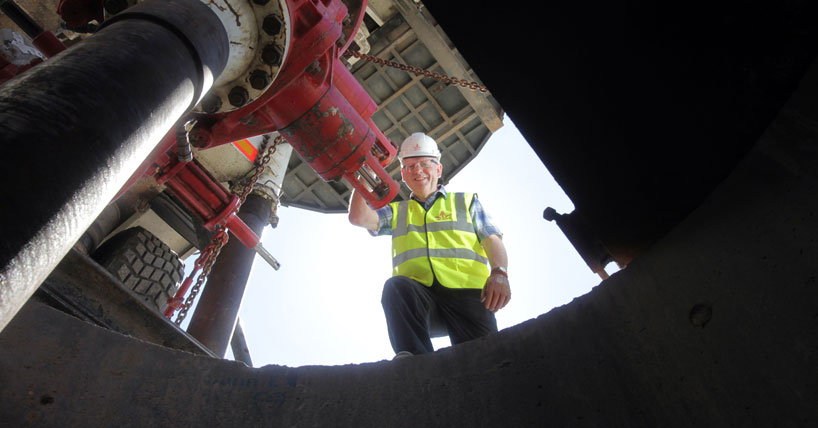
Paul Younger – From Geology Graduate to Sustainability Champion
Paul Younger’s journey began in the early 1980s when he enrolled at Newcastle University as a Geology undergraduate. Settling in Leazes Terrace student accommodation, he balanced academic rigour with extracurricular involvement, notably as a member of the Gilbert and Sullivan Society at the Students’ Union. After earning his degree in 1984, Younger stayed on to pursue a PhD in Civil Engineering, completing it in 1990. His transition from geology to engineering set the stage for a career that would blend scientific inquiry with a profound commitment to environmental stewardship.
The Significance of the Blue Plaque and the Paul Younger Centre
On 27 October 2025, South Tyneside Council erected a blue plaque at the Paul Younger Centre in Hebburn town centre—a poignant tribute to a graduate who spent his life advancing sustainability. The centre, named in Younger’s honour, operates as a cutting‑edge renewable‑energy hub, showcasing solar panels and a combined heat‑and‑power (CHP) unit that power an advanced 450 kW air‑source heat pump system. This installation not only serves the local community but also demonstrates the practical application of academic research in reducing carbon emissions.
Innovations in Renewable Energy: Air Source Heat Pump Technology
Air‑source heat pumps (ASHPs) extract heat from ambient air and convert it into hot water for residential or commercial use. The Paul Younger Centre’s two‑stage 450 kW ASHP has achieved remarkable efficiencies, enabling the council to cut reliance on gas boilers and lower annual carbon emissions by an estimated 320 tonnes. By integrating local solar generation and CHP, the system achieves near‑autonomy, illustrating how scalable renewable solutions can operate in an urban setting.
Key Technical Highlights
- Two‑stage compression enhances performance across temperature ranges.
- Integration of CHP reduces grid dependence during peak periods.
- Modular design allows incremental expansion as community needs grow.
Impact on Newcastle: The City of Science and Technology Vision
Beyond the campus, Younger played a pivotal role in positioning Newcastle as a “City of Science and Technology.” His leadership at the Newcastle Institute for Research on Sustainability (NIReS) helped foster partnerships between industry, academia, and municipal bodies. He also spearheaded the first deep‑well geothermal drilling program in the city, demonstrating that unconventional resources could play a vital role in a low‑carbon future.
Community Engagement and Public Outreach
Younger’s columnist work as the “Go Green Doctor” in the Newcastle Chronicle made sustainability accessible to the broader public. By answering everyday queries, he demystified complex topics—e.g., the difference between renewable and non‑renewable energy sources—encouraging citizens to adopt greener habits. Additionally, his service as a Deputy Lieutenant of Tyne and Wear underscored a deep commitment to civic responsibilities.
Award‑Winning Research and the Queen’s Anniversary Prize
In 2005, Younger led a multidisciplinary research team that secured Newcastle University’s first Queen’s Anniversary Prize for Higher Education. The award recognised pioneering work on remediation of mining‑associated pollution, a field that combined environmental chemistry, civil engineering, and societal impact analysis. This accolade cemented Younger’s reputation as a globally respected expert in environmental remediation.
Lessons for Future Engineers and Sustainability Leaders
Younger’s career trajectory offers several actionable insights:
- Interdisciplinary focus is essential. Bridging geology and civil engineering allowed Younger to approach sustainability from multiple angles.
- Community involvement amplifies impact. Engaging with local policy and media ensures that research outputs translate into tangible societal benefits.
- Innovation thrives in collaboration. Partnerships between universities, industry, and government can accelerate the deployment of technologies like air‑source heat pumps.
Getting Involved: Alumni and Community Opportunities
Newcastle University provides several pathways for alumni and community members to engage with sustainability initiatives:
- Alumni programmes that facilitate mentorship for current students entering engineering fields.
- Volunteer opportunities at the Paul Younger Centre, offering hands‑on experience with renewable energy systems.
- Partnerships with the City of Science and Technology consortium to fund research grants.
By participating, you not only honour Paul Younger’s legacy but also contribute to a broader movement toward environmental resilience.
Key Takeaways
- Paul Younger’s multidisciplinary expertise underpinned groundbreaking sustainability solutions.
- The blue plaque and Paul Younger Centre symbolize local commitment to renewable energy.
- Community‑focused research can secure prestigious awards and influence public policy.
- Alumni engagement fosters a culture of continuous innovation.
As the world grapples with climate change, the principles exemplified by Younger—interdisciplinary collaboration, public engagement, and technological innovation—remain vital. By learning from his legacy, upcoming engineers and community leaders can drive meaningful change.
Take the Next Step
Explore alumni engagement programmes, learn more about the Paul Younger Centre’s renewable technologies, or schedule a virtual tour to witness these innovations firsthand. Share your own sustainability projects with our alumni network and keep the conversation alive. For more information, contact the alumni office or connect with the sustainability research community at Newcastle University.

